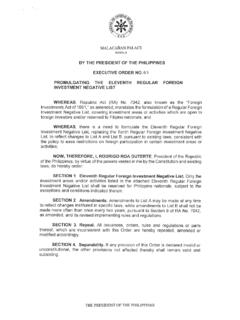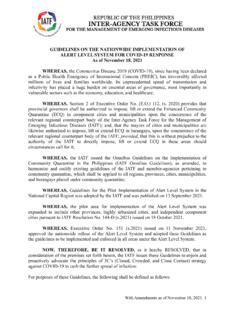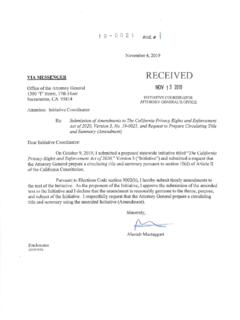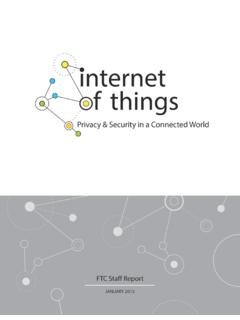Transcription of Implementing Rules and Regulations of Republic Act No ...
1 Republic of the Philippines NATIONAL PRIVACY COMMISSION. Implementing Rules and Regulations of Republic Act No. 10173, known as the Data Privacy Act of 2012 . Pursuant to the mandate of the National Privacy Commission to administer and implement the provisions of the Data Privacy Act of 2012, and to monitor and ensure compliance of the country with international standards set for data protection, the following Rules and Regulations are hereby promulgated to effectively implement the provisions of the Act: Rule I. Preliminary Provisions 1. Title 2. Policy 3. Definitions Rule II. Scope of Application 4. Scope 5. Special Cases 6. Protection afforded to data subjects 7. Protection afforded to journalists and their sources Rule III. National Privacy Commission 8. Mandate 9. Functions 10. Administrative Issuances 11. Reports and Public Information 12. Confidentiality of Personal Data 13. Organizational Structure 14. Secretariat 15. Effect of Lawful Performance of Duty 16.
2 Magna Carta for Science and Technology Personnel Rule IV. Data Privacy Principles 17. General Principles 18. Principles of Transparency, Legitimate Purpose and Proportionality 19. Principles in Collection, Processing and Retention a. Collection must be for a specified and legitimate purpose b. Personal Data shall be processed fairly and lawfully c. Processing should ensure data quality d. Personal data shall not be retained longer than necessary e. Any authorized further processing shall have adequate safeguards 20. Principles for Data Sharing Rule V. Lawful Processing of Personal Data 21. Lawful Processing of Personal Information 22. Lawful Processing of sensitive Personal Information and Privileged Information 23. Extension of Privileged Communication 24. Surveillance of Subjects and Interception of Recording of Communications Rule VI. Security Measures for Protection of Personal Data 25. Data Privacy and Security 1. 26. Organizational Security 27.
3 Physical Security 28. Technical Security 29. Appropriate Level of Security Rule VII. Security of sensitive Personal Information in Government 30. Responsibility of Heads of Agencies 31. Requirements Relating to Access by Agency Personnel to sensitive Personal Information 32. Implementation of Security Requirements 33. Applicability to Government Contractors Rule VIII. Rights of Data Subject 34. Rights of the Data Subject a. Right to be informed b. Right to object c. Right to access d. Right to correct e. Right to rectification, erasure or blocking 35. Transmissibility of Rights of the Data Subject 36. Right to Data Portability 37. Limitation on Rights Rule IX. Data Breach Notification. 38. Data Breach Notification 39. Contents of Notification 40. Delay of Notification 41. Breach Report 42. Procedure for Notification Rule X. Outsourcing and Subcontracting Agreements. 43. Subcontract of Personal Data 44. Agreements for Outsourcing 45. Duty of Personal Information Processor Rule XI.
4 Registration and Compliance Requirements 46. Enforcement of the Data Privacy Act 47. Registration of Data Processing Systems 48. Notification for Automated Processing Operations 49. Review by the Commission Rule XII. Rules on Accountability 50. Accountability for Transfer of Personal Information 51. Accountability for Violation of the Act, these Rules and other issuances Rule XIII. Penalties 52. Unauthorized Processing of Personal Information and sensitive Personal Information 53. Accessing Personal Information and sensitive Personal Information Due to Negligence 54. Improper Disposal of Personal Information and sensitive Personal Information 55. Processing of Personal Information and sensitive Personal Information for Unauthorized Purposes 56. Unauthorized Access or Intentional Breach 57. Concealment of Security Breaches Involving sensitive Personal Information 58. Malicious Disclosure 59. Unauthorized Disclosure 60. Combination or Series of Acts 61.
5 Extent of Liability 62. Large-Scale 2. 63. Offense Committed by Public Officer 64. Restitution 65. Fines and Penalties Rule XIV. Miscellaneous Provisions 66. Appeal 67. Period for Compliance 68. Appropriations Clause 69. Interpretation 70. Separability Clause 71. Repealing Clause 72. Effectivity Clause Rule I. Preliminary Provisions Section 1. Title. These Rules and Regulations shall be known as the Implementing Rules and Regulations of the Data Privacy Act of 2012 , or the Rules . Section 2. Policy. These Rules further enforce the Data Privacy Act and adopt generally accepted international principles and standards for personal data protection. They safeguard the fundamental human right of every individual to privacy while ensuring free flow of information for innovation, growth, and national development. These Rules also recognize the vital role of information and communications technology in nation-building and enforce the State's inherent obligation to ensure that personal data in information and communications systems in the government and in the private sector are secured and protected.
6 Section 3. Definitions. Whenever used in these Rules , the following terms shall have the respective meanings hereafter set forth: a. Act refers to Republic Act No. 10173, also known as the Data Privacy Act of 2012;. b. Commission refers to the National Privacy Commission;. c. Consent of the data subject refers to any freely given, specific, informed indication of will, whereby the data subject agrees to the collection and processing of his or her personal, sensitive personal, or privileged information. Consent shall be evidenced by written, electronic or recorded means. It may also be given on behalf of a data subject by a lawful representative or an agent specifically authorized by the data subject to do so;. 3. d. Data subject refers to an individual whose personal, sensitive personal, or privileged information is processed;. e. Data processing systems refers to the structure and procedure by which personal data is collected and further processed in an information and communications system or relevant filing system, including the purpose and intended output of the processing.
7 F. Data sharing is the disclosure or transfer to a third party of personal data under the custody of a personal information controller or personal information processor. In the case of the latter, such disclosure or transfer must have been upon the instructions of the personal information controller concerned. The term excludes outsourcing, or the disclosure or transfer of personal data by a personal information controller to a personal information processor;. g. Direct marketing refers to communication by whatever means of any advertising or marketing material which is directed to particular individuals;. h. Filing system refers to any set of information relating to natural or juridical persons to the extent that, although the information is not processed by equipment operating automatically in response to instructions given for that purpose, the set is structured, either by reference to individuals or by reference to criteria relating to individuals, in such a way that specific information relating to a particular individual is readily accessible.
8 I. Information and communications system refers to a system for generating, sending, receiving, storing, or otherwise processing electronic data messages or electronic documents, and includes the computer system or other similar device by which data is recorded, transmitted, or stored, and any procedure related to the recording, transmission, or storage of electronic data, electronic message, or electronic document;. j. Personal data refers to all types of personal information;. k. Personal data breach refers to a breach of security leading to the accidental or unlawful destruction, loss, alteration, unauthorized disclosure of, or access to, personal data transmitted, stored, or otherwise processed;. 4. l. Personal information refers to any information, whether recorded in a material form or not, from which the identity of an individual is apparent or can be reasonably and directly ascertained by the entity holding the information, or when put together with other information would directly and certainly identify an individual.
9 M. Personal information controller refers to a natural or juridical person, or any other body who controls the processing of personal data, or instructs another to process personal data on its behalf. The term excludes: 1. A natural or juridical person, or any other body, who performs such functions as instructed by another person or organization; or 2. A natural person who processes personal data in connection with his or her personal, family, or household affairs;. There is control if the natural or juridical person or any other body decides on what information is collected, or the purpose or extent of its processing;. n. Personal information processor refers to any natural or juridical person or any other body to whom a personal information controller may outsource or instruct the processing of personal data pertaining to a data subject;. o. Processing refers to any operation or any set of operations performed upon personal data including, but not limited to, the collection, recording, organization, storage, updating or modification, retrieval, consultation, use, consolidation, blocking, erasure or destruction of data.
10 Processing may be performed through automated means, or manual processing, if the personal data are contained or are intended to be contained in a filing system;. p. Profiling refers to any form of automated processing of personal data consisting of the use of personal data to evaluate certain personal aspects relating to a natural person, in particular to analyze or predict aspects concerning that natural person's performance at work, economic situation, health, personal preferences, interests, reliability, behavior, location or movements;. 5. q. Privileged information refers to any and all forms of data, which, under the Rules of Court and other pertinent laws constitute privileged communication;. r. Public authority refers to any government entity created by the Constitution or law, and vested with law enforcement or regulatory authority and functions;. s. Security incident is an event or occurrence that affects or tends to affect data protection, or may compromise the availability, integrity and confidentiality of personal data.
















